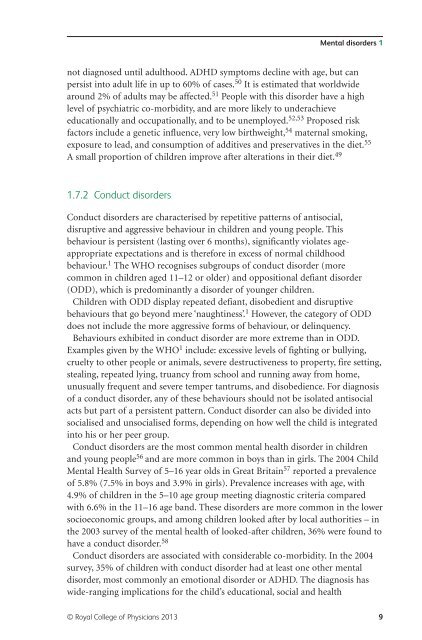Smoking and mental health - NCSCT
Smoking and mental health - NCSCT
Smoking and mental health - NCSCT
You also want an ePaper? Increase the reach of your titles
YUMPU automatically turns print PDFs into web optimized ePapers that Google loves.
Mental disorders 1<br />
not diagnosed until adulthood. ADHD symptoms decline with age, but can<br />
persist into adult life in up to 60% of cases. 50 It is estimated that worldwide<br />
around 2% of adults may be affected. 51 People with this disorder have a high<br />
level of psychiatric co-morbidity, <strong>and</strong> are more likely to underachieve<br />
educationally <strong>and</strong> occupationally, <strong>and</strong> to be unemployed. 52,53 Proposed risk<br />
factors include a genetic influence, very low birthweight, 54 maternal smoking,<br />
exposure to lead, <strong>and</strong> consumption of additives <strong>and</strong> preservatives in the diet. 55<br />
A small proportion of children improve after alterations in their diet. 49<br />
1.7.2 Conduct disorders<br />
Conduct disorders are characterised by repetitive patterns of antisocial,<br />
disruptive <strong>and</strong> aggressive behaviour in children <strong>and</strong> young people. This<br />
behaviour is persistent (lasting over 6 months), significantly violates ageappropriate<br />
expectations <strong>and</strong> is therefore in excess of normal childhood<br />
behaviour. 1 The WHO recognises subgroups of conduct disorder (more<br />
common in children aged 11–12 or older) <strong>and</strong> oppositional defiant disorder<br />
(ODD), which is predominantly a disorder of younger children.<br />
Children with ODD display repeated defiant, disobedient <strong>and</strong> disruptive<br />
behaviours that go beyond mere ‘naughtiness’. 1 However, the category of ODD<br />
does not include the more aggressive forms of behaviour, or delinquency.<br />
Behaviours exhibited in conduct disorder are more extreme than in ODD.<br />
Examples given by the WHO 1 include: excessive levels of fighting or bullying,<br />
cruelty to other people or animals, severe destructiveness to property, fire setting,<br />
stealing, repeated lying, truancy from school <strong>and</strong> running away from home,<br />
unusually frequent <strong>and</strong> severe temper tantrums, <strong>and</strong> disobedience. For diagnosis<br />
of a conduct disorder, any of these behaviours should not be isolated antisocial<br />
acts but part of a persistent pattern. Conduct disorder can also be divided into<br />
socialised <strong>and</strong> unsocialised forms, depending on how well the child is integrated<br />
into his or her peer group.<br />
Conduct disorders are the most common <strong>mental</strong> <strong>health</strong> disorder in children<br />
<strong>and</strong> young people 56 <strong>and</strong> are more common in boys than in girls. The 2004 Child<br />
Mental Health Survey of 5–16 year olds in Great Britain 57 reported a prevalence<br />
of 5.8% (7.5% in boys <strong>and</strong> 3.9% in girls). Prevalence increases with age, with<br />
4.9% of children in the 5–10 age group meeting diagnostic criteria compared<br />
with 6.6% in the 11–16 age b<strong>and</strong>. These disorders are more common in the lower<br />
socioeconomic groups, <strong>and</strong> among children looked after by local authorities – in<br />
the 2003 survey of the <strong>mental</strong> <strong>health</strong> of looked-after children, 36% were found to<br />
have a conduct disorder. 58<br />
Conduct disorders are associated with considerable co-morbidity. In the 2004<br />
survey, 35% of children with conduct disorder had at least one other <strong>mental</strong><br />
disorder, most commonly an emotional disorder or ADHD. The diagnosis has<br />
wide-ranging implications for the child’s educational, social <strong>and</strong> <strong>health</strong><br />
© Royal College of Physicians 2013 9














